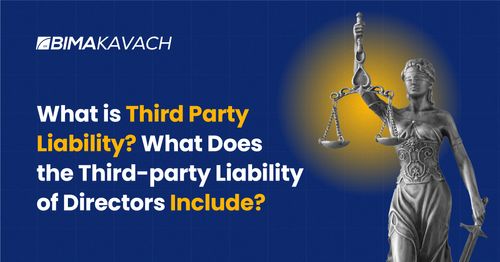Directors play a vital role in the governance and decision-making processes of companies, guiding their strategic direction and ensuring compliance with legal and ethical standards. However, with great power comes great responsibility and this is particularly true when it comes to the interests of third parties who may be affected by the company's actions. In the corporate world, the concept of third-party liability holds directors accountable for their decisions and actions that impact external stakeholders. This article explores the key aspects of third-party liability, shedding light on its scope, potential risks, and the regulatory frameworks that govern directors' responsibilities.
Before diving deep into the main topic, let’s turn our attention to the basics!
What do we mean by third-party liability?
Third-party liability refers to the legal responsibility or accountability that an individual or entity holds towards individuals or entities outside of their immediate relationship. When an individual becomes subject to a third-party liability claim, it can have significant implications on their personal and financial well-being. Such claims arise when someone is alleged to have caused harm or damage to a third party, either through their actions or negligence.
Third-party liability claims often lead to legal proceedings, which can be time-consuming, emotionally draining, and financially burdensome. The individual may need to hire legal representation to defend their case, incurring substantial legal fees and expenses. If found liable, they may be responsible for compensating the injured party for their losses, which could include medical expenses, property damage, loss of income, or other related costs. This can result in significant financial strain, especially if the damages awarded are substantial.
Third-party liability of directors Includes
The third-party liability of directors includes a broad range of legal obligations and potential consequences. It relates to the directors' duty to act in the best interests of the company and its various stakeholders, which includes not only shareholders but also employees, customers, suppliers, creditors, and the wider community. Directors are entrusted with the responsibility to exercise due care, skill, and diligence when making decisions on behalf of the company. They are expected to act honestly and in good faith, avoiding conflicts of interest that could compromise their impartiality and potentially harm third parties. Furthermore, directors must ensure compliance with applicable laws and regulations, such as those related to consumer protection, environmental protection, labor rights, and financial transparency. Failure to uphold these obligations may result in legal liabilities for directors personally, with potential consequences ranging from fines and injunctions to disqualification from holding directorships and even criminal charges in severe cases.
Get Free Quote in Minutes
As per the terms of the Companies Act of 1956, liabilities to Directors to third parties can be classified as follows:
- Prospectus: Failure to provide any particulars as required by Section 56 and Schedule II of the Act, or misstatement of facts in the prospectus, makes a director personally accountable for resulting damages to a third party. Furthermore, if the party subscribes for any shares /debentures on the basis of the prospectus, the director shall be made liable to pay compensation, as specified in Section 62, for any loss or damage the party may experience as a result of any incorrect or misleading statement included therein. The director may, however, avoid liability if he offers evidence of his innocence.
- With regard to allotment: Directors may also be held personally liable for-
- Irregular allotment - Irregular allotment is defined as allotment before the minimum subscription is received (Section 69) or without filing a copy of the statement in lieu of the prospectus (Section 70). According to section 71(3), any director of a company who knowingly violates or willfully authorizes or permits the violation of any of the provisions of sections 69 or 70 with respect to the allotment, shall be responsible to compensate not only the company but also the allottee respectively for any loss, damages, or costs
- Failure to repay application money in case of minimum subscription not received- According to Section 69(5) of the Act and SEBI rules, if the minimum subscription is not obtained within 120 days of the opening of the issue, money must be reimbursed to all applicants who registered for shares within 130 days of the date of the prospectus's release. If the money is not repaid, the company's directors will be jointly and severally liable to refund it with interest at the rate of 6% per annum on the 130th day. A director, on the other hand, is not liable if he can prove that the failure to reimburse money was not the result of any improper conduct or negligence on his behalf.
- Failure to repay application money in case of an application for listing of securities not made or refused- Section 73(2) requires the company to repay, without interest, all amounts received from applicants in accordance with the prospectus, if the permission for the listing of the company's shares has not been applied for or if such permission has been applied for but has not been granted. If any such money is not repaid within eight days after the company becomes liable to repay, the company and every director shall be jointly and severally liable to repay that money with the prescribed interest rate.
- Unlimited liability: Directors may also be held personally accountable to third parties if their liability is deemed unlimited in the MOA in accordance with sections 322 or 323 of the Act.
- Fraudulent trading: If the Directors are found guilty of fraudulent trading throughout the course of company operations, they may be held personally accountable for a company's debts or obligations, under Section 542 of the Act. Section 542(1) further provides that if, during the process of winding up a company, any business of the company has been carried on with the intent to defraud creditors or any other person, the concerned director shall be held personally liable for the company's debts or other liabilities, without any limitation of liability.
Other third-party liabilities of directors can be classified as follows-
- Fiduciary Duty: Directors have a fiduciary duty to act in the best interests of the company and its stakeholders, which includes third parties. They must exercise due care, skill, and diligence in their decision-making processes to ensure that the interests of third parties are not harmed.
- Contracts and Agreements: Directors may be personally liable if they enter into contracts or agreements on behalf of the company that breach legal obligations or harm third parties. It is important for directors to ensure that they have the authority to act on behalf of the company and that the contracts entered into are lawful and fair to all parties involved.
- Environmental and Labor Laws: Directors can be held liable for non-compliance with environmental laws, such as pollution control regulations, and labour laws, including those related to workplace safety and employment conditions. They are responsible for ensuring that the company operates in accordance with these laws to prevent harm to third parties, such as employees and the environment.
- Consumer Protection: Directors have a duty to protect the interests of consumers and ensure that the company's products or services meet quality standards and adhere to consumer protection laws. Failure to do so can result in liability for directors if consumers suffer harm or losses due to the company's actions or products.
- Securities and Financial Laws: Directors of publicly listed companies must comply with securities and financial regulations, such as those related to disclosures, financial reporting, insider trading, and corporate governance. Violations of these laws can lead to personal liability for directors and may result in penalties, fines, or other legal consequences.
- Criminal Liabilities: Directors can face criminal liabilities if they engage in criminal activities, misrepresentation, or other illegal acts that harm third parties. Criminal offenses can lead to prosecution, fines, imprisonment, or disqualification from holding directorships.

How can directors protect themselves from personal liability?
If you are a company director, you will agree that management must frequently make significant and seemingly controversial business choices on the spot. Such judgments made during normal business operations can expose you to potential litigation from regulators, consumers, competitors, shareholders, employees, and government authorities (to mention a few!). You may also face claims and lawsuits for discrimination, harassment, claimed violations of employment practices, the expense of regulatory investigations, defending and settling claims, paying compensation, and so on. A pricey lawsuit can have a significant impact on your personal finances.
In such cases, Directors and Officers liability insurance can come in handy. It is a policy designed to shield directors, board members, and other personnel in management or supervisory positions from potential legal obligations. This insurance protects the personal assets of the directors and officers and pays for the settlements and legal costs related to such litigation and disputes. However, it excludes charges arising from purposefully dishonest or fraudulent acts, claims arising from intentional omissions, errors, or negligence when delivering professional services, intentional acts of violating a law, contract, or regulation, cyber threats, and so on.
It is also critical to note that Dno insurance cannot provide a guarantee against financial loss and that the coverage provided may be subject to policy restrictions and limitations. As a result, before purchasing Directors and officers liability insurance coverage, study the terms and conditions thoroughly.
Conclusion:
We have seen that the third-party liability of directors encompasses the legal obligations and responsibilities directors bear concerning the interests of external stakeholders. By exploring the intricacies of this liability, this article aims to provide a clearer understanding of the expectations placed on directors and the potential consequences they may face for breaching their obligations.
Recognizing and fulfilling these responsibilities is essential for directors to uphold the highest standards of corporate governance and contribute to sustainable and responsible business practices. For more information on any topics related to business and insurance, you may contact BimaKavach. Here, you can also get the best recommendation for any insurance product in just 5 minutes.

